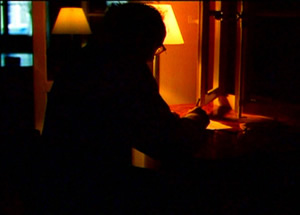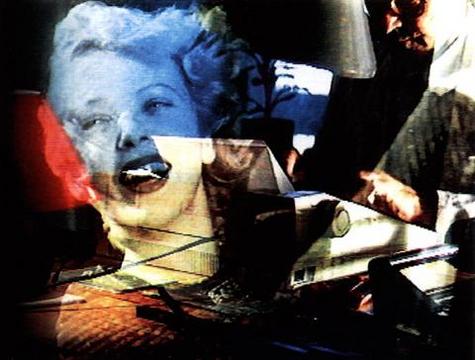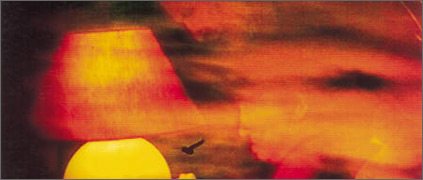 HOMMAGE A GODARD
HOMMAGE A GODARDIn Praise of Obscurity

With King Lear (1997), Godard came close to disowning cinema. With JLG/JLG (1995), one of the last poets of cinema produced one of the most profound statements on the nature of the nature of cinema. With Eloge de l'Amour (2001), Godard circles back, using a mélange of classic black-and-white, disintegrating (monochrome) film stock, and garish (color) direct video to capture the destruction of memory and the quandry of generating images at all. Here, too, is the origin of Milan Kundera's lament regarding "imagology". Godard's last few films are all cinematic laments.
 Eloge de l'Amour opened at Cannes in April 2001 to very mixed reviews. As a result, this film has taken over one year to reach the US market. It will play in out-of-the-way cinemas, here and there, and vanish. But it will no doubt appear on DVD at about the same time that it vanishes from American screens. Apropos of obscure works of art, it may then make its barely discernible mark.
Eloge de l'Amour opened at Cannes in April 2001 to very mixed reviews. As a result, this film has taken over one year to reach the US market. It will play in out-of-the-way cinemas, here and there, and vanish. But it will no doubt appear on DVD at about the same time that it vanishes from American screens. Apropos of obscure works of art, it may then make its barely discernible mark.Image (right) - JLG/JLG: Autoportrait de Décembre (1995)
Godard's film is more or less going 'straight to video' like a teen slasher flick. Hence, "In praise of obscurity" ...
 "Eloge de l'amour, c'est d'abord du vrai noir et blanc comme on n'en fait plus. Et il y est question de quelque chose de l'amour, de l'amour de quelque chose. L'amour de la résistance, de la mémoire, du cinéma, de la langue française, de l'histoire..."
Eloge de l'Amour (Le Monde Diplomatique, 05/2001)
"Eloge de l'amour, c'est d'abord du vrai noir et blanc comme on n'en fait plus. Et il y est question de quelque chose de l'amour, de l'amour de quelque chose. L'amour de la résistance, de la mémoire, du cinéma, de la langue française, de l'histoire..."
Eloge de l'Amour (Le Monde Diplomatique, 05/2001)"Touching upon everything from man's place in history to the marauding nature of Hollywood to popular culture, the film's complex structure and themes don't make easy viewing. Stick with it though, and it's a highly rewarding experience, further heightened by sumptuous music and committed performances." Review 1 (BBC, 11/14/01)
"This film has the air of a celluloid commonplace book, a forum for Godard's fragments and doodlings about love and history -- fascinating in many ways, and pregnant with meaning, but often frustrating. Edgar's reading in the classics has given him a taste for the epigram. 'Most people have the courage to live their lives,' he ponders, 'but not to imagine them.' A brilliant aperçu, but one we have to pay for with yards of maundering and meandering. Both Godard and Edgar are in search of the meaning of adulthood, that intensely realised period of self between the homogeneity of childhood and old age: it is a time in which the individual's relationship with the constituent and determinant factors of history are most fully realised." Review 2 (The Guardian Unlimited, 11/23/01)
 "Godard, owning the era's generational mojo as no other filmmaker did, had a run of some 15 masterpieces in that span, from Breathless to 1968's Le Gai Savoir, and including Contempt, Band of Outsiders, Alphaville, Masculin-Feminin, and Weekend. The general impression that Godard is a cold, intellectually forbidding filmmaker is decimated by a second look at his '60s movies, which are quintessentially spontaneous, intimate, quirky, heartfelt, warmly realistic, and sometimes as messy as a fucked-in bed. These movies don't merely depict things, or present situations, or tell stories -- they throb with life." Review 3 (The Village Voice, 08/28/02)
"Godard, owning the era's generational mojo as no other filmmaker did, had a run of some 15 masterpieces in that span, from Breathless to 1968's Le Gai Savoir, and including Contempt, Band of Outsiders, Alphaville, Masculin-Feminin, and Weekend. The general impression that Godard is a cold, intellectually forbidding filmmaker is decimated by a second look at his '60s movies, which are quintessentially spontaneous, intimate, quirky, heartfelt, warmly realistic, and sometimes as messy as a fucked-in bed. These movies don't merely depict things, or present situations, or tell stories -- they throb with life." Review 3 (The Village Voice, 08/28/02)Image (right) - Histoire(s) du cinéma (1988-1998)
"As In Praise of Love reveals, [Godard's] work has changed in the last dozen years, during what seems to be his autumnal period. The Brechtian signboards have multiplied, to the point that practically every line of dialogue is a quotation from a literary source or a venerable film. The soundtrack, too, has grown more dense, swirling and flowing with a life of its own. Meanwhile, the actors have diminished in importance (no more personalities on the scale of Palance, Piccoli, Bardot). Mr. Godard now treats them as just another set of elements in his editing mix. There's no longer much of a sense that the camera is probing the outside world. What you see and hear seems internal to Mr. Godard." Review 4 (The New York Times, 09/01/02)
"His latest work is such a creative and intellectual triumph, however, that not even the movie world's chronic commercialism could relegate it entirely to short-lived glimpses on the festival circuit. A courageous company called Manhattan Pictures is convinced that significant numbers of viewers enjoy rising to an artistic challenge now and then." Review 5 (The Christian Science Monitor, 09/06/02)
INTERVIEW - Praise Be To Godard (The Guardian Unlimited, 02/11/00)
Eloge de l'Amour first appeared in New York at the Autumn 2001 Film Festival, then (re)opened in New York September 6, 2002 @ Angelika Film Center and Lincoln Plaza Cinemas, and returned to New York (Walter Reade Cinema @ Lincoln Center) in May 2003 as part of the Swiss Peaks Festival
OUTTAKES - Dossier Jean-Luc Godard (Ecran Noir) / Histoire(s) du cinéma, TV series/video essay made for Canal+, ARTE and Gaumont, from 1988 to 1998 ...
James Williams, Michael Temple and Michael Witt (eds.), For Ever Godard: The Work of Jean-Luc Godard 1950 to the Present (London: Black Dog, 2003) - "For the last 50 years, Jean-Luc Godard's work in cinema and video has innovated, provoked and inspired. Reviewing this key film and video maker of the twentieth century, For Ever Godard provides a new context for his work. / In the last couple of years Godard's recent work on film and video has featured strongly in debates about audio-visual art and culture. Especially regarding questions of historical memory, technological change, and the future of cinema in all its forms. This historical moment provides the perfect opportunity for a critical reassessment of Godard's entire corpus and its key role in culture. For Ever Godard addresses new issues like; Godard as an experimental multimedia artist; the importance of voice and music in his work; the influence of Benjamin and Blanchot; and new aspects of production and representation. Godard's work is considered within the context of the history of film, For Ever Godard is providing a new essential view to anyone interested in cinema." (Black Dog) - Cloth, 384 pages, ISBN 1-901-03369-4

DETAILS - Eloge de l'Amour (In Praise of Love) - DIRECTOR/SCREENPLAY: Jean-Luc Godard - W/: Bruno Putzulu, Cecile Camp, Jean Davy, Francoise Verny, Philippe Lyrette, Audrey Klebaner, Jeremy Lippman, Claude Baigneres, Remo Roflani, Mark Hunter, Bruno Mesrine, Djellou Beghoura - RELEASE: FR 04/2001; UK 11/2001; US 04/2002 / PLEASE NOTE: In Praise of Love arrived on DVD July 22, 2003 ...
All other images (with exception of top, left) from Eloge de l'Amour ...
Regarding Notre Musique (2004) ...
"VOYAGES EN UTOPIE": JEAN-LUC GODARD 1946-2006 - Pompidou (Paris), May 11, 2006 through August 14, 2006 - "Pour beaucoup, le nom de Jean-Luc Godard est devenu aussi mythique que celui de Picasso. Tous deux ont imposé une révolution du regard au 20e siècle. Poursuivant une démarche originale depuis les années 1960, et tout en se nourrissant inlassablement des grandes œuvres du passé, Godard a changé notre manière de voir et d'écouter un film. Son style, reconnaissable entre tous, remet en question de façon radicale la narration classique et joue, sur l'image et dans la bande son, de citations de philosophes ou de poètes, de tableaux et d'extraits de films. Il est devenu une signature de la modernité. Proche, par la conception et l'esprit, de ses monumentales Histoire(s) du cinema, réalisées entre 1988 et 1998, Voyage(s) en utopie, comme les films du cinéaste qui bousculent le spectateur dans la simple réception passive d'une histoire, propose au visiteur les éléments d'un collage aux multiples associations possibles. Films, séquences de films, tableaux, images, autant de signes dont se nourrit l'imaginaire du réalisateur et dont il revient à chaque visiteur de nourrir sa propre réflexion ou sa propre rêverie. Voyage(s) en utopie est une œuvre de Godard qui ne se projette pas sur un écran mais se déploie dans l'espace." (Pompidou) / For a review, see Nathan Lee, "Jean-Luc Godard, France's Film Provocateur, Directs His Own Tribute", The New York Times (June 25, 2006), pp. AR17/19 ...
